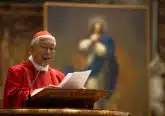‘Nationalistic tendencies’ threaten world peace, pope tells diplomats

IMAGE: CNS photo/Reuters
By Junno Arocho Esteves
VATICAN CITY (CNS) — As it did prior to the Second World War, the rise of nationalism in the world poses a threat to peace and constructive dialogue among nations, Pope Francis said.
During his annual address to diplomats accredited to the Vatican, the pope said that the establishment of the League of Nations nearly 100 years ago ushered a new era of multilateral diplomacy based on goodwill, readiness among nations to deal fairly and honestly with each other and openness to compromise.
However, he warned in his speech Jan. 7 that the lack of one of those necessary elements results in nations searching "for unilateral solutions and, in the end, the domination of the powerful over the weak."
"The League of Nations failed for these very reasons, and one notes with regret that the same attitudes are presently threatening the stability of the major international organizations," the pope said.
Clearly, he added, "relationships within the international community, and the multilateral system as a whole, are experiencing a period of difficulty with the resurgence of nationalistic tendencies at odds with the vocation of the international organizations to be a setting for dialogue and encounter for all countries."
In his nearly one-hour speech to the diplomats, the pope warned that the re-emergence of populist and nationalist ideologies is "progressively weakening" multilateral institutions and subsequently creating a "general lack of trust, a crisis of credibility in international political life and a gradual marginalization of the most vulnerable members of the family of nations."
An essential aspect of good politics, he said, is the pursuit of the common good that would enable individuals and the international community as a whole to "achieve their proper material and spiritual well-being."
"Peace is never a partial good, but one that embraces the entire human race," he said.
Recalling the ongoing humanitarian crises in countries such as Ukraine and Syria, Pope Francis urged the international community to defend the most vulnerable in the world "and to give a voice to those who have none."
Among those most affected by instability, he noted are Christian communities in the Middle East where many people have been forced to flee from violence and persecution, particularly due to the resurgence of attempts "to foment hostility between Muslims and Christians."
The pope expressed his hope that his upcoming visits to the United Arab Emirates and to Morocco would provide an opportunity to "advance interreligious dialogue and mutual understanding between the followers of both religions."
Pope Francis also made an appeal for assistance to migrants who are forced to emigrate due to "the scourge of poverty and various forms of violence and persecution," as well as natural disasters and climate change.
"All human beings long for a better and more prosperous life, and the challenge of migration cannot be met with a mindset of violence and indifference, nor by offering merely partial solutions," he said.
Among the most vulnerable in today’s world, the pope continued, are young people who face an "uncertain future" due to lack of employment.
Urging world leaders to take steps to ensure the physical, psychological and spiritual growth of children, Pope Francis acknowledged the church’s failure to protect children.
Child sexual abuse, especially by members of the clergy, "is one of the plagues of our time," he said.
"The abuse of minors is one of the vilest and most heinous crimes conceivable," he said. "Such abuse inexorably sweeps away the best of what human life holds out for innocent children and causes irreparable and lifelong damage."
The church is committed to preventing clerical sex abuse and its concealment, he said, expressing hope that his Feb. 21-25 meeting with the presidents of the world’s bishops’ conferences will be "a further step in the church’s efforts to shed full light on the facts and to alleviate the wounds caused by such crimes."
Pope Francis also urged the diplomatic community to continue to work toward building peace between nations divided by war.
While there have been significant strides in building peace in some places, such as the end of the decades-long conflict between Ethiopia and Eritrea and an easing of relations between North and South Korea, the pope called for peace in areas such as Venezuela and the Holy Land which are still affected by internal strife and divisions.
Citing St. Paul VI’s 1965 speech to the United Nations, the pope said that peace is not built merely through politics and protecting interests but with "the mind, with ideas, with works of peace."
– – –
Follow Arocho on Twitter: @arochoju
– – –
Copyright © 2019 Catholic News Service/U.S. Conference of Catholic Bishops. www.catholicnews.com. All rights reserved. Republishing or redistributing of CNS content, including by framing or similar means without prior permission, is prohibited. You may link to stories on our public site. This copy is for your personal, non-commercial use only. To request permission for republishing or redistributing of CNS content, please contact permissions at [email protected].













